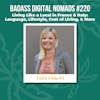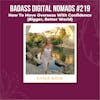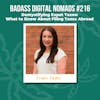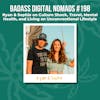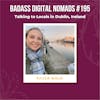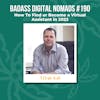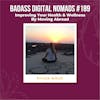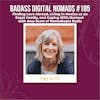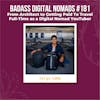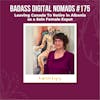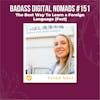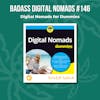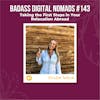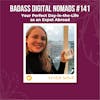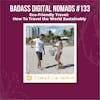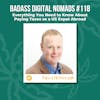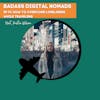How I See the U.S. After 15 Years Abroad (EXTENDED UNCUT VERSION)

How I see the US after living abroad as an expat for 15+ years: The pros, cons, and reverse culture shock I've experienced. (This podcast is the full, uncut version of a video I published on YouTube last week and includes topics not included in the video.)
How I see the US after living abroad as an expat for 15+ years: The pros, cons, and reverse culture shock I've experienced.
This podcast is the full, uncut version of a video I published on YouTube last week. It includes topics not included in the video, like:
- Dating in the U.S.
- Safety and Violence
- Commercialism and Chain Stores/Restaurants
- And More
SHOW NOTES & RESOURCES
- Videos:
- Blog: "Dating Abroad as a Digital Nomad"
- Travel insurance and banking for digital nomads, remote workers, and world travelers:
.......................................................................................................
Thank you to my current 2021 Patrons! Teklordz, Trader Walt, Shawn, Karen, Christine, Erik, Heather, Colin, Craig, RZ, Timothy, James, Richard, Fred, Lakshay, Issac, George, Scott, Michael J, Derek, and Issac, George, and Mike M.
My goal is to create a community of 100 Patrons in 2021! You can become a Patron for $5/month at Patreon.com/travelingwithkristin and see all my YouTube videos first, attend monthly live streams, submit questions for the podcast, and be the first to find out about special offers and guests, as well as the chance to participate in beta programs at free or discounted rates.
.......................................................................................................
Support the Badass Digital Nomads Podcast:
- Become a Patron for $5 per month
- Leave a 5* Review: https://lovethepodcast.com/digitalnomad
- Buy Official Merch
- Search All Episodes: www.badassdigitalnomads.com
Connect with Kristin on Social Media:
- Follow on Instagram
- Subscribe to Traveling with Kristin on YouTube
- Subscribe to Digital Nomad TV on YouTube
- Join the Badass Digital Nomads Facebook Group
Podcast descriptions may contain affiliate links of products and services we use and recommend at no additional cost to you.
Sneak Peek:
Kristin: 00:00:00 I had to actually explain to the construction workers like how to install the window because they didn't have windows in their houses. So it's like when you have that perspective, I don't wanna sound pretentious because I know that I've had like a lot of opportunities and privileges to travel, but it also humbles you and grounds you. And so when I hear even my family members talking about silly, trivial things that happened, I'm just like, get over it. <laugh> like none of that is important. Let's not waste our time having a negative conversation about something that really doesn't matter in the whole scheme of the world.
Introduction: Welcome to Badass Digital Nomads, where we're pushing the boundaries of remote work and travel, all while staying grounded with a little bit of old school philosophy, self-development, and business advice from our guests.
Kristin: 00:00:54 Hi everyone. Kristin from Traveling with Kristin here and today's podcast is the uncut version of a YouTube video I published last week on how I see the United States after 15 years living abroad. Now, technically when I add it all up, I've spent about 20 years in foreign countries, but you get the idea. Anyway, there has been an incredible reaction in the comment section of that video with hundreds of comments in just the first eight hours alone. So definitely go check it out over at youtube.com/TravelingWithKristin and join the conversation because there are people from all over the world telling their stories and sharing similar sentiments and other things that I hadn't thought of to put in the video. So it's really been fun to um, talk with people over there and I'm about halfway through the comments but getting there. So the YouTube version on this topic was edited for brevity because you know, <laugh> YouTube attention spans.
Kristin: 00:02:03 I tried to keep it at 30 minutes instead of the full 45 minutes or an hour, whatever this podcast ends up being. But um, I wanted to share the full version with you here that includes more topics like dating and safety in the US versus abroad and also commercialism in retail and restaurants and the difference between living out of a suitcase while you're traveling versus uh, living out of a closet when you're at home and kind of how people react to your wardrobe and what you're wearing. So there's a few other things in this that were unfortunately cut out of the video, but now I wish I had published the whole thing there. Anyway, if you watch the video and it resonated with you, you'll definitely enjoy this more comprehensive take with this extra bonus content. And likewise, if you haven't seen the video yet but you enjoy this podcast, go and check it out afterwards so you can get more of the visual elements to illustrate the storylines and to um, meet some other people in the comments and share your stories with them.
Kristin: 00:03:12 I'm really curious to hear if you have had any of the same thoughts that I'm sharing with you in the podcast today. So remember to either leave a comment on YouTube or on badassdigitalnomads.com and of course leave a review for the podcast wherever you listen to help other people find it too and send this uh, podcast to someone else who has lived in foreign countries or who has spent a lot of time traveling abroad and has maybe been thinking about some of the same things but hasn't shared them publicly. And hopefully this will resonate with them too. Enjoy.
Kristin: 00:03:58 So this is a bit of a different style of video than I've made before on this channel, but I've been wanting to make it for pretty much the whole year that I've been back living in the US because it has been the first time in my entire adult life since I was 16 years old that I have spent so much time continuously in my home country and since coming back due to the global circumstances, there's just quite a few things that I've noticed that have either been intriguing me or bothering me or saddening me about what life in modern day America is like. So I just wanted to share some of these insights with you. The good, the bad and the ugly. I'm curious to hear your thoughts or if you agree and I don't wanna offend anyone, but sometimes cliches and stereotypes are based in truth and some stereotypes about the US I have come to believe are in fact quite true.
Kristin: 00:05:07 So I'll tell you all of the things that I've noticed since uh, living here since early March of 2020. So if you're new here, you're probably wondering where the heck have you been <laugh> this whole time? Well if you've ever lived abroad you know that sometimes you say you're gonna go for one month or one year but then you never come back and that's pretty much what happened with me. I lived abroad for the first time when I studied abroad at 20 years old and one semester turned into two semesters and then when I graduated from college I went back abroad to Costa Rica for one year and one year turned into seven or eight, yada yada yada <laugh>. I've still been living abroad since then. So in total I've spent at least 15 years living in 60 different countries. And even though I had a completely normal middle class American upbringing, I just stumbled into the expat lifestyle back in college and then took it from there because once I realized that I could live in foreign countries and typically for less money than it cost me to live in the US I just kept going <laugh>.
Kristin: 00:06:26 And the only reason that I came back here was because I happened to rent an apartment in Miami for two or three months to come for the weather and for Miami Music Week back in uh, February, March. And then I stayed <laugh> because we all got locked down and now I'm still here at the end of the year. So long story short, I've been to a lot of countries. I've helped more than a thousand people relocate to other countries and I've learned a lot along the way. And naturally when you live abroad for a long time and then you come back to your home country, you experience some degree of culture shock. And I never expected to be living in the US this entire year. But now that I have, I figured I would put that perspective out there and uh, maybe we can all learn something from it.
Kristin: 00:07:24 So whether these things are positive or negative or good or bad, you be the judge. I'm gonna try to be as objective as possible. Here we go. The first thing that I noticed when I got back to the US was the most obvious thing, which is the consumerism and materialism mentality of America. Everything is just so big, so out there, so expensive, so extreme in some cases or so, kind of like overdone and exaggerated everything from the cars to the roads to the shopping malls to the quantities of food that you get at restaurants to the selection of stuff that you can get at the grocery store. And so the first thing I had was kind of this consumerism overload when I got back and I spent so much money in the first two months that I was here just on going out to eat and groceries and like buying stuff on Amazon.
Kristin: 00:08:27 I mean I had been living in countries that didn't even have Amazon and one time I had to mail some stuff from Bali and I had to actually mail it on a ship like it took three months to get to my house In Florida and in the US it's like you can get everything you want on demand and everything always has to be bigger and better and I guess that's part of the nature of like capitalism and competition and also the US having so much space to like expand and grow into. But everything is really larger than life here. <laugh> like even today it's been eight or nine months that I've been here and still when I walk into the grocery store I'm still overwhelmed with the selection of stuff that's in there and snacks and impulse buys at the cash register when you're trying to leave.
Kristin: 00:09:20 It's quite impressive the way that um, corporations and marketing experts and people have designed stores in such a way to really maximize the profit per square foot. It's really hard to get in and out of there without spending more money than you had anticipated. And I don't recall ever having that problem really in other countries. Usually when I'm traveling like I am sad that there's only one brand of peanut butter <laugh> and I used to actually travel with certain things that I really liked like peanut butter because I couldn't get like the natural organic kind that I wanted. I used to travel with like pharmaceuticals and all kinds of stuff that I was afraid that I couldn't get in other places because everything is just so convenient and so available in the US. But the other thing that started happening once I got back was I started feeling like I needed more stuff and that I needed to kind of keep up with the Joneses more even though everybody was on lockdown.
Kristin: 00:10:26 And even though I was like I don't technically live here, like all of a sudden I started feeling weird for not having a car like that. That was a bad thing. Whereas I've gone years without having a car. But when I think back to the last time that I spent any time in the US I had like a really nice car. So it feels weird to be here without having a car like walking around or riding my bike like I used to do in Amsterdam, which is totally normal to do in other countries. And then here it's like weird or it's inconvenient or it takes longer or there's like a stigma to it. So I don't have a car right now but even when I did have a car I never used it 'cause I just rode my bike everywhere 'cause I liked it. And then the other thing is I'm used to just living out of my suitcase wearing the same clothes every day and really not having much selection and not thinking about it because when you live in other countries and you don't know that many people, well first of all no one caress what you're wearing regardless <laugh>.
Kristin: 00:11:35 But when you are traveling full-time you're aware that no one caress because no one knows you. Or even if you meet people while you're traveling it's like no one's thinking about that because they're all living out of their suitcases too. And then here I found myself feeling like I needed to dress up more. Like I needed to wear high heel shoes again for the first time in years and wear more makeup and stuff like that. And I started to wonder why <laugh>? And I think it's just because you become a product of your environment to a degree. Like I've been traveling for years with like one little travel makeup case and yet here my friends have an entire bathroom and vanity full of like beauty products and it's just overkill. Along those same lines, it's not just the culture and society of consumerism, it's also the in your face marketing and advertising like the sheer volume of billboards and ads and commercial breaks on TV and what they are advertising for has been quite jarring.
Kristin: 00:12:45 First and foremost the pharmaceutical marketing and advertising like it's illegal to advertise pharmaceutical drugs and I think every single country except the US. And so to see such a huge volume of commercials pushing drugs for people to like self uh, prescribe a drug from watching a commercial and then to go to their doctor and ask for that drug is just very shocking. Shocking that that's allowed and accepted. And then to see billboards like advertising the ER wait times advertising hospitals like why would you want to advertise something like good about the er <laugh>? Hopefully you don't have to go there ever. I don't know. That kind of thing is really weird but then it's even convenience items. So I saw a commercial the other day on a type of dish washing detergent that was like, are you tired of scrubbing your pan so hard? Get this dishwashing detergent that goes in like the dishwasher.
Kristin: 00:13:52 And I was thinking there's not even dishwashers in most houses in other countries around the world and adds for dryer sheets. Like I haven't had a dryer in years. There's not dryers in Europe it's very rare that you would have a dryer and a dishwasher in your house. So to see advertisements for like drier sheets and more efficient liquids that go in the dishwasher where you don't have to wash the dishes anyway is kind of surreal. Now this consumerism thing isn't something new to me because I remember when I was selling real estate in Costa Rica, I think it was probably around 2009 or 2010 and I remember these clients specifically that bought this beautiful ocean view lot and they were like, we wanna simplify, we wanna move down to Costa Rica. And so they sold all of their stuff like they got rid of hundreds of thousands of dollars worth of stuff that was in their house in Massachusetts and they moved to Costa Rica and they literally replaced all of their stuff.
Kristin: 00:15:00 Like they built a three story house and filled it with more stuff and they invited me to come see it when it was done and I was like, what is all of this stuff? And they had basically imported their consumer habits <laugh> from the US to Costa Rica and they even brought a container of their stuff down too. So the stuff that they didn't sell, they brought in a shipping container and paid a lot of import taxes and transported it to this like beach house on a cliff. And that just really stuck with me because I was like, this is not the definition of simplifying <laugh>, this is just replacing the stuff that you already had When it comes to status, I don't think a lot of Americans realize that status is like not that important in other countries or it is minimalized or kind of hidden.
Kristin: 00:15:54 Like in the Netherlands for example where I've been living for on and off for a few years, people don't, they're not flashy with money. Like you wouldn't know if someone had a lot of money. Like everyone kind of wants to like blend in and look the same and dress the same. And even the royalty, like even the king and queen of the Netherlands are known for being quite modest to like ride their bikes around just wear normal clothes and whatever. And then in the US everything is just flashier more expensive and the bigger the better. And so I have been feeling like there's more pressure to show off a little bit here. Another thing I realized really quickly once I got here was that the pace of life is significantly more intense in the US whether it's like the rush hour traffic or everything, like everyone's rushing around.
Kristin: 00:16:50 Even if you work from home, chances are you've probably worked or you've probably eaten at your desk while working from home even though you don't have to commute anywhere and even though you don't have to like go downstairs to get food or go pick it up. And I think that that just comes from this ingrained workaholic American culture. And I find myself working more now for sure. I thought I would have more time because I wasn't traveling and I was just here and I just feel like I'm working more but I'm like why <laugh>? Maybe it's 'cause I don't have much else to do right now. But um, yeah that workaholic culture here and just being busy is definitely at the forefront of what I'm observing. The weird thing though is that people seem to also be bored. So it's kind of like a hurry up and crash mentality.
Kristin: 00:17:42 It's like wake up early, do all this stuff, be really busy all day, get your food and everything delivered because who has time to to cook or who has time to go out. And then of course if you have kids at home now it's crazy. But then at the end it's like people just stop, crash and then watch Netflix. And if it's the weekend too, it's like you have to zone out and do nothing just to be able to give your body time to recuperate from all of that adrenal burnout or just rushing and pushing yourself so hard through the week. I have found that in other countries people have more balance, at least people have a better quality of life and like a more sustainable pace of life that isn't so intense. Like the first time I went to Europe, one of the first things I noticed was the leisurely lunches and just so many people sitting outside and enjoying the weather, enjoying the daytime, enjoying their food, enjoying a glass of wine or a beer with lunch.
Kristin: 00:18:43 And that just doesn't happen in the US unless it's Sunday brunch or something. On that note regarding the food, I have to say that the food kind of sucks in the US like there's really good restaurants in the US but the quality of the ingredients is not good. It's like the food just doesn't taste as good. I'm not saying there's not amazing chefs and amazing restaurants but the quality of the ingredients, the quality of the inputs that go to make the dishes are not good quality compared to other countries. And a lot of the reason for that I think is because there are a few really big food providers. So everything tastes quite uniform well not just the food suppliers but also the factory farming, the GMO ingredients, the mass production, you can taste the difference in the food and there is a lack of flavor And also because in the US convenience consumerism you can get any food, any fruit, any vegetable in or out of season at any time of year as long as you wanna pay more for it.
Kristin: 00:19:53 But that means that the food isn't as fresh or it's had to travel farther to get here or in like a less natural environment. But in other countries I've eaten a lot more seasonally and the food might be simpler but it tastes better. Like I'm convinced that kids would like to eat vegetables more if their vegetables came from Bulgaria <laugh> like I spent quite a bit of time in Bulgaria the last couple years and the food like you can only get what's in season. I remember wanting to get sweet potatoes and I had to drive to the capital of Sophia like two and a half hours away. Well I didn't just go for sweet potatoes but I made sure to go to a big grocery store where I could find sweet potatoes 'cause I was craving them and it was summer and they, they didn't have any.
Kristin: 00:20:43 But throughout my travels I have such vivid memories of specific foods that I ate my entire life growing up in the US but that just tasted completely different in that other country because it was from there. It was local produce, it was organic, it was in season so whether it was a pineapple in Costa Rica or an avocado or tomatoes and bell peppers and cherries and apples and plums and pears and peaches and Bulgaria. Pretty much everything in Bulgaria tastes good. Uh, there are yogurt too, <laugh> or fish in Japan obviously. So fresh, so good arugula in Italy, house wine in France. It's like when you get the product or the ingredient locally and it just grows there and it's in season, it tastes amazing and when it's not genetically modified. And so I feel like I've been spending a lot of money eating out for like really mediocre food that kind of taste the same in every restaurant.
Kristin: 00:21:53 It's weird. And like another problem all stemming from the consumerist point of view of always having to consume more stuff, more food mixed with the um, lesser quality of the food ingredients mixed with processed food results in obesity. So the US obesity rate right now is 42.4%, which is the first time apparently in the country's history that it's been over 40% but it might be half of that in the other countries that I've lived in. Like it's only 18 or 19% in the Netherlands and Japan where I lived last year, it's 31% in South Africa it's 35% in Brazil, but Brazil, the US has one of the highest obesity rates in the world and I can't help but think that it's a combination of all those factors. Also drinking, I feel like people drink more <laugh>, my friends included. It's like we don't really go out to, we don't go out much right now anyway, but like when I would go to see them it was like drink from Friday afternoon through Sunday night and then wake up and go to work on Monday.
Kristin: 00:23:05 And I know that other countries like the UK and Ireland and pretty much a lot of countries ingest a lot of alcohol every year. But I feel like the, the way that Americans treat drinking, it's like always to get drunk as fast as possible and just exceeding moderation. And so that's another thing. And hey, apparently the alcohol sales have skyrocketed in 2020 but that's probably for another reason. Speaking of being home a lot and working from home though I've noticed that the infrastructure is not so good. <laugh>, my internet in this particular apartment has, it goes out multiple times per day and I don't know how many times I've called Xfinity, I've even gotten a backup with AT&T but I looked it up and the US has pretty mediocre, moderate internet speeds on the global index but it ranks a hundred and 19th out of like 206 countries when it comes to the cost.
Kristin: 00:24:09 So internet, uh, telecommunication, cell phone service, these things are really expensive in the US and not in other places. So in Estonia or Bulgaria you could pay a few euro and get like an unlimited data plan on your sim card or in Mexico I just got three sim cards for clients it cost me like $10 each to get a data plan for one month. I mean in the US like your cell phone's probably gonna be at least 30 or $40 a month to more than a hundred dollars per month. You're probably paying over a hundred dollars for your internet and cable package and you'll be paying a third of that in another country. But even though there's not good customer service with the monopoly style companies like telecommunications providers in the US, a positive thing I have noticed is how good the service is in general.
Kristin: 00:25:07 Like if you go out to eat at a bar or a restaurant or any service that you go to get at like a salon retail store, people are really friendly and the customer service is really good. I mean it's a tipping society so maybe people are working for better tips. Maybe it's just a cultural thing. But I always feel like when I go out in public in the US the people are really nice whether they are selling me something or not. I mean strangers strike up conversations with me quite often. Could be like at the pharmacy or waiting in line at the fresh market or just standing and watching the sunset here in Miami. <laugh>, I mean Americans are friendly and they are very nice and when I lived in Paris my neighbors and people on the street were not talking to me <laugh> like they were not just oh Bonjour, no.
Kristin: 00:26:05 Like you don't talk to people that you don't know in other countries but in the US it's like everyone's so friendly that hey if they're strangers or just friends you haven't met yet. And I really like that about the US but I've noticed that it can be a little bit shallow like these are like friendly acquaintance type of conversations. But then when it comes to making new friends, I found that to be particularly difficult this year and I found dating to be particularly hard and I have found the conversations that I have had when I'm getting to know people like through mutual friends or going on a date or something like that has been uh, different, like less depth than it has been during my travels. And maybe it's because when you're traveling and you're meeting foreigners and other places you don't know when you're gonna see them again.
Kristin: 00:27:02 So you kind of cut through the like small talk and you get straight to really deep <laugh> kind of like existential things and philosophical and things about life. And even with the um, even making friends with locals, like I've just had some amazing conversations in my travels but I've noticed meeting people here, a lot of stuff centers around the day to day. A lot of it is kind of like gossipy, which I'm also not used to because when you don't live in your home country, like no one talks about you 'cause no one even knows you're there <laugh>. So it's been weird to be back into this cycle of kind of like pettiness. Um, like one girl got mad at me, uh, because she said that I didn't say goodbye to her when like leaving dinner, but I did, I had to leave early but she doesn't remember because she was really drunk.
Kristin: 00:28:02 So then like her friends, like our mutual friends told me that she was mad at me and like that sort of stuff. I'm just really not used to that after having living abroad for 15 years. And it's weird that they get wrapped up about rather insignificant things because it's kind of first world problems. Maybe it's all of the headaches and the the hassles and like Murphy's Law and things that go wrong while you travel or maybe it's being exposed to extreme poverty and pain like publicly that you can see in the streets that it's kind of made me think that those, the little things in life, like the good little things, those little moments in life are very meaningful but like little annoyances are not important. So when people are complaining to me that someone cut them off in traffic or someone said this to them on a zoom call or someone said this about so-and-so or what was she wearing or whatever, I'm like, you know, I've seen what it's like living in slums and living in a landfill and having never been outside the gates of that landfill.
Kristin: 00:29:16 And I know what it's like to live without electricity and have not know what a window is because you've never had a window in your house. Like what is glass? When I lived in Nicaragua um, and I was managing the construction on an office, I had to actually explain to the construction workers like how to install the window because they didn't have windows in their houses. So it's like when you have that perspective, I don't wanna sound pretentious because I know that I've had like a lot of opportunities and privileges to travel, but it also humbles you and grounds you. And so when I hear even my family members talking about silly trivial things that happened, I'm just like, get over it. <laugh> like none of that is important. Let's not waste our time having a negative conversation about something that really doesn't matter in the whole scheme of the world.
Kristin: 00:30:05 Also another quick word on dating because people ask me about dating while traveling or dating as a digital nomad all the time and I've also written about it a bit on Medium. This is another thing that came up for me this year while I was living back in the US. Growing up in the US I had a certain perspective on dating where at first when I was growing up I thought like okay well you meet your future husband when you graduate from high school or college and then you get married and you have kids in the white picket fence and all that ordeal. But then anyone who has dated into adulthood, you know how difficult it can be to find someone who's looking for the same things as you. But then when I was traveling I thought, oh it would be easier to date because I'm only here temporarily so I'm not really looking for a boyfriend so it should be a lot easier to like meet people.
Kristin: 00:30:56 And guys actually didn't wanna date me because they knew I was traveling. So my assumption was that it would be a bonus <laugh> that I was traveling because things wouldn't get too serious. Whereas their perspective was like they were looking for a long-term relationship and I couldn't provide that so therefore they didn't wanna see me again. And that kind of hurt my feelings, but I get it. And then now coming back to the US after having that on my mind and being like, oh okay, like maybe these guys wanna a relationship and just getting back on dating apps and things like that and noticing that people are looking for something less long-term and that could just be my experience. But I've just noticed overall that there seems to be like more focus on casual dating in the US versus when I was living in other countries.
Kristin: 00:31:52 Another thing that was quite shocking when I first got here was how intense the mainstream media was and the news, it seems like there's only three topics that people talk about on the news and that is politics, healthcare and violence in a protest or riot situation or gun control or just like bad things. <laugh>. And obviously coronavirus is a big topic in the news everywhere in the world, but overall in the US it seems to be this cycle of like, uh, fear, politics, violence, healthcare. Because of course there's like a massive strain on the healthcare system because it's super expensive, people are sick, people are obese, and then just like outrage over everything. And other countries obviously covered these topics and cover politics and things in their news, but most other countries have a public option in their healthcare system or healthcare is free or it's included in your taxes or whatever.
Kristin: 00:32:56 Or they don't have as big of health problems as we do. So it's not like always the main focus of the conversation in the news. And other countries also have political debates and different sides and different ideologies and perspectives, but most countries have more than two main political parties. So it's not like this us versus them mentality all the time. It's kind of more diluted and distributed among different groups. I'm not saying that there's any right or wrong way, but it definitely makes sense when I look at the culture of the US how everything has kind of become simplified and gamified. So it's kind of like, you know, red versus blue, my football team versus your football team, this state rivalry versus another state or this city versus that city or us versus them or Mexicans on this side of the wall, Americans on this side of the wall, you could look at it on a macro scale and be like, hey, everyone in the world is on the same team because we're all human beings living on a shared planet.
Kristin: 00:34:02 Or at least you can say like, okay, if it's in the Olympics, everyone on your country is on the same team. But in America there's like these different levels of division and prejudice and racism and and anger and like pitting each other against each other at every level in every facet of society, even if it's in different departments in your company. And so I don't know, I think that that maybe that comes from a lot of different things, but it's really not necessary like the degree that we have it in this country, but at the end of the day people are inherently good and that doesn't matter what country you're from. So in America I think most people are good <laugh>, it's just that people get dehumanized. And so when you don't have face-to-face or individual interaction with the other side, it can be really easy to just be against something like an idea or a person or a group of people.
Kristin: 00:35:03 And um, that gets propagated a lot in the media and it's just more pronounced and more in your face than it is in other countries. Like I feel like I've had to make much more of an effort to get an international perspective on what's going on in the world because it's really hard to drown out the noise of the domestic media and like the biggest media conglomerates in the us. So I've definitely had to make a big effort at that. There's also that mentality that other countries are more dangerous than the US that we get bombarded with here when that's not necessarily true. The US ranks at the bottom of the global peace index for example, but the narrative in the US is much different and it's based on fear of foreign rather than domestic threats. So we're always told here that we have to be afraid of other people, other countries, other cultures, intruders from other places and that if we just had all of our borders closed that we would be safer, but the research would say otherwise.
Kristin: 00:36:13 And my experience traveling the world as a solo female traveler anecdotally has been consistent with that. Even as far back as when I first moved abroad when I was 20 years old, my parents thought that I was gonna get kidnapped or you know, abducted and like murdered or something like that. And I explained to them that I had a better chance of that happening walking through the Walmart parking lot while I was a student in college versus traveling with my friends on a surf trip to Mexico. I used to travel with a mace bracelet or like a mace spray and it was years before someone told me like that's illegal in other countries like self-defense items or weapons that are legal in the US not just guns but like mace and other sorts of self-defense protection things are illegal in other countries. And it's like I have a a girlfriend who got in trouble and got on probation in the Netherlands because she got caught with mace in the airport and here you can just go buy mace at the, at Walmart.
Kristin: 00:37:17 That's another thing. There's not so many commercial stores in other countries like the US is is quite literally the land of chain stores and strip malls and restaurants and parking lots. Like you just wouldn't see that in most other countries, especially not to the degree that we have it here. One of the biggest things I've noticed though is the price of everything. Like it really is more expensive to live in the US than most countries, even in Florida, which is a tax-free state when it comes to state income taxes. And we have a lower cost of living than a lot of other states. Things are still really expensive here. Like it's quite easy for me to spend more money on rent than my entire cost of living per month in Croatia or Portugal or Costa Rica. Like my rent while living abroad has been anywhere from 150 euro per month living in Bulgaria to like maximum maybe two or $3,000 a month in a place like Australia or Japan or Hong Kong.
Kristin: 00:38:29 But in the US like my neighborhood, just looking around for like a one bedroom unfurnished apartment in a nice area of Miami is like easily $1500 to 2 or $3,000 a month or a two bedroom. And then on top of that you have hundreds of dollars in your electricity bill and your internet and everything like that. It's like I pay more for internet in the US than my entire rent cost in Bulgaria. I pay more for just utilities here than I spent renting a four bedroom house in a vineyard in Montenegro. And for what I pay for a furnished Airbnb here, I could get a two or three bedroom furnished Airbnb on the beach in Mexico. So yeah, the cost of rent is more, the cost of utilities is more, the cost of insurance is more, the cost of healthcare is more <laugh> like if I want healthcare in the US my insurance policy is probably at least three to $350 per month with like a 10 or $15,000 deductible.
Kristin: 00:39:39 Or I could pay like a thousand dollars per year or even a few hundred dollars per year to get travel and emergency medical coverage with SafetyWing. So it's pretty crazy. Like I just pay out of pocket to get medical treatment anywhere in the world. Like I'll pay $10 or $20 for a doctor's appointment in Thailand or Costa Rica or Nicaragua or something like that. And the same thing here or the same procedure would cost thousands of dollars. I think overall the biggest thing I've noticed is that the US is a bit of like a walking contradiction and a paradox. People don't realize how good they have it here and how comfortable their lives are and how safe they are and how secure they are compared to what it could be like they complain and get upset about small things. Also, the big things too that we should be getting upset about, like massive injustices in our system, institutional racism, our political problems, poverty, hunger, like the US has a lot of problems <laugh>.
Kristin: 00:40:45 But in the the day-to-day, like minutiae of life, I think people fail to see the big picture, but it's not necessarily their fault because they are being bombarded from all sides, from the news, from advertising, from media with symbolism, consumerism, hidden messages, just so many signs of what to do and what to be and how to fix themselves and how they're not enough. Whether it's you know, a certain brand of clothing that they need or a certain pharmaceutical they need. And I just hope that everyone watching this, if you are from the US or from any country to start like questioning the types of things that you are seeing, hearing, consuming and asking, do you want that to be your truth? Do you want that to be your reality? There's something called the Hofstede Index, which ranks countries by different variables like how individualistic or collectivist they are and each country can get a different score.
Kristin: 00:41:56 And when I studied this in college, I found it so interesting because I didn't even know what that was. <laugh>, I didn't know that the US was an ethnocentric individualistic country. So you know, obviously more capitalist than socialists, whereas other countries like India or countries in Latin America are more collectivist, which means that the community is put before the individual. And so since the industrial times, the US has gotten more individualistic and people have become more separated and more spread out. And I think that that could be one of the causes of the problems that we're facing in modern day society, especially with people taking on a hundred percent of the responsibility for childcare and remote learning, and both parents having to work full-time jobs to put food on the table and still being below the poverty line. And like all of these other issues in the us which is like another thing, we are told that the US is the best at most things or has the best everything, but that's not necessarily true.
Kristin: 00:43:08 So I heard a guy on the news saying, yeah, we have the best healthcare system in the world, but blah, blah, blah. Like he had to preface what he was saying with propaganda. <laugh> like the US doesn't have the best healthcare system in the world. Like it doesn't make the top of world rankings for pea--the peace index, happiness, safety education. I mean we're just not the best at everything like the internet speed. So just keeping things in perspective and realizing that not everything is what it seems. I think that people here are inherently good, it's just that everyone would benefit by getting a bit more of an external perspective, being able to live and work in other countries to see what life is like in other places. Letting more people in, not trying to keep everybody out and not being afraid of losing something that might not even be real.
Kristin: 00:44:11 Like when it comes to status. I mean, coming back to the US during this time has reminded me a bit of why I felt comfortable staying away for so long and why I've basically dedicated my entire life to helping people figure out ways that they can live life on their own terms so that they don't have to remain stuck in one physical geographic place or in one paradigm or in one way of thinking. So if you are thinking of traveling somewhere or moving somewhere, living somewhere else, like just pursue that, pursue that curiosity and keep trying to open your worldview. Before I publish this video, I just have one more reflection for you. The United States of America is a phenomenal country full of hundreds of millions of amazing people. But my perception is that in many ways we have been taught more to value hard work and independence sometimes at the expense of logic, empathy, and humanity.
Kristin: 00:45:30 It goes without saying that the capitalist US system has resulted in more freedom, more wealth, more innovation, and more opportunity for countless people in multiple generations across the planet. However, <laugh> the system isn't perfect and it doesn't always work in the best interest of individual people. So when contemplating your unique place in this completely wondrous time of human history that we find ourselves living in right now, how can you ensure that you are living your life in accordance with your values, your principles, and your goals while being discerning in what you consume, whether that's what you read or what you eat or what you buy. And equally important how you react to the many distractions and temptations and the noise of the external world. Feeling gratitude for the conditions that we find ourself in on the planet right now, but also acknowledging and confronting the very real challenges of modern day life can help us diagnose where we are feeling stuck and where we're feeling unhappy.
Kristin: 00:46:58 In 1772 men, John Hancock and Samuel Adams made a decision to speak up and they took actions that would, in the words of Napoleon Hill, spark the revolution that would quote, change the entire trend of civilization. And he also writes, the power which gave this nation its freedom, is the self same power that must be used by every individual who becomes self-determining the power that gave this nation its freedom must be used by each and every individual in his or her individual path in life. The ability to travel to solo travel as a female in the world today is not lost on me and it has given me such clarity in my worldview, but also in my sense of self and in a degree of confidence that I don't think that I could have attained in any other way. And my goal in making this channel was to pass on that gift to <laugh>.
Kristin: 00:48:18 I can't say it. Okay, two millions of people that I've never met and will never meet. And so I hope that my videos in this video have helped you make more sense of the world and your unique place in it because I believe that all of us are here for a reason and we're here to help each other on this crazy journey. So I'm curious to hear your thoughts. And now let's get back to the conclusion of this video. So that was kind of a long rambling video, but hopefully it made you think. Let me know in the comments below if you agree or anything I missed. I'm sure, even though I talked a lot, I missed a lot of stuff. And um, see you in another video. Bye. Thank you so much for listening and remember to leave a review for the podcast wherever you listen and share this episode with someone you think it might help.
Kristin: 00:49:30 And to further support the podcast, plus get tons of access to exclusive behind the scenes content. Consider becoming Patreon patron for just $5 per month. You can enjoy early access to preview my YouTube videos. Get exclusive patron only posts and personal updates that I only share on Patreon. Join my private monthly live streams and live q and as and get behind the scenes access to private, unlisted live podcast interviews or Zoom video recordings that are only available to my patron. You also get the ability to vote on upcoming videos and podcast guests and can submit your questions for our guests directly. You'll also get discounts on merch and swag and many more surprises on deck throughout the year. And again, you can become a patron for just $5 a month at patreon.com/TravelingWithKristin. That's P-A-T-R-E-O-N.com/TravelingWithKristin; K-R-I-S-T-I-N. And thank you for your support.
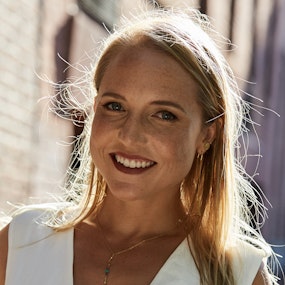
Kristin Wilson
Host of Badass Digital Nomads & YouTube's Traveling with Kristin / Author of Digital Nomads for Dummies
Kristin Wilson is a long-term digital nomad and location-independent entrepreneur who has lived and worked across 60 countries in 20 years. Since founding a fully-remote, international relocation company in 2011, she has helped more than 1,000 people retire or live abroad in 35 countries. Today, she helps aspiring remote workers, digital nomads, and expats achieve their lifestyle goals through her YouTube channel (Traveling with Kristin) and podcast, Badass Digital Nomads.
Kristin is the author of Digital Nomads for Dummies. She's also a Top Writer on Medium and Quora in the topics of business, travel, technology, life, productivity, digital nomads, and location independence. She has been featured on The Today Show, Bloomberg Businessweek, Business Insider, ESPN, The New York Times, WSJ, Huffpost, HGTV’s House Hunters International, and more.




































